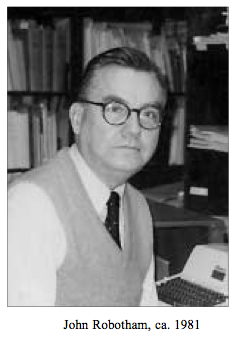John Robotham
Last Updated on March 23, 2024 by Tom Pratum
My Life and Times

Our national heroes – Jefferson, Lincoln, and the rest – have taken a beating lately, proving they were human too. I still have regard for Lincoln, though; after all he was born on my birthday, although some years earlier. I was born in West Concord, New Hampshire, during the first quarter of the last century, but I don’t remember the event. I do remember Lindbergh going past our house in a touring car and waving to the few people in each yard.
I have equally vivid memories of a pink lady’s slipper (Cypripedium acaule) and an Indian pipe (Monotropa uniflora). Unlike most plants I saw, they were the only individuals of their species around, which may be why I remember them so clearly. But also, we were surrounded by fields and woods, and the plants and animals that inhabited them seemed close in every way.
We lived on the second floor of a white, clapboard house. Six ancient specimens of Acer saccharum shaded the front. A large garden ran down one side, and a chicken coop and a dozen apple trees occupied the back. The owners, Mr. and Mrs. Jedediah Quinn, lived downstairs. Every fall I went to the cider press with Mr. Quinn. Collecting maple sap was a springtime activity, and I remember the big pots on kitchen stoves where it was boiled down to the second best thing on earth, maple syrup, or further boiled down to the best thing, maple sugar.
We fished a lot, for pickerel and “hornpout” in the Merrimack River, for black bass in Long Pond. Everybody went blueberrying. Ghosts were everywhere, the ghosts of history. Mrs. Quinn was descended from Major Rogers of French and Indian War fame. A friend’s grandfather had been in the Gold Rush of 1849. A Concord coach (you’ve all seen them in Westerns) was displayed in the train station. And Hannah Dustin’s monument was nearby. The ability to use an axe was once an essential skill.
I had read about men who could fell a tree so precisely that it would drive a stake into the ground. That’s why I chopped down what seemed like a huge Pinus strobus. I was about ten. Ernest Thompson Seton’s Two Little Savages and his Book of Woodcraft were my guides in all this. I quite literally read them to pieces. We moved to Rhode Island and then to New Jersey not long after these events. My father’s trade, paving cutting, had about ceased to exist, and he bought a store.
By working 90 hours a week for ten years he made a go of it. I did the usual things—delivered papers, became a Boy Scout, and played whatever sport was in season. Sunday, December 7, 1941, looked like another dull day in the small towns of New Jersey. The Redskins-Giants game on the radio that afternoon seemed the only bright spot. I was in the store with my little radio, with which I could pick up basketball games from the Middle West and tickertape baseball games when the Giants, Dodgers and Yankees were away. During the football game, military personnel were ordered back to their bases. It didn’t seem important at first. Then came news about Pearl Harbor.
A year and a day later I was in the Army. Basic training consisted of close order drill on a golf course in Miami Beach, a session with gas masks, and a session at the firing range with a Springfield bolt action rifle and a Thompson submachine gun. Then I was sent to the Army Air Corps Weather School in Grand Rapids, Michigan, and shortly after to Brazil, where I spent the next two and one half years. About one year of that time I spent in Macapa, a small town on the bank of the Amazon River and right on the Equator. Our job—there were three of us—was to send hourly weather reports to the nearest base. I learned to speak Portuguese, explored the surrounding territory, including a nearby, 18th century fort, and made a 6-day trip into the interior with an alligator hunter.
When the war was over, I didn’t enlist again, but went to the City College of New York and, after graduating, to the Columbia School of Library Service. While there, I took a temporary job with The New York Public Library. Thirty years later, I retired. Not wishing to deprive the economy of my spending powers, I worked at several research libraries before retiring again—this time to Oregon. About 30 years earlier, some things I had written were published, and I caught the infection. Since then it’s been scribble, scribble, scribble. Editing seemed a logical outcome, and I thank the NPSO for the opportunity to edit its Bulletin.
– John Robotham, Emerald Chapter
